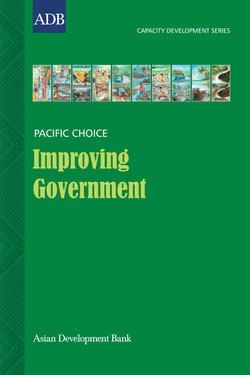Читать книгу Improving Government - Michael Heppell - Страница 5
INTRODUCTION
ОглавлениеCapacity development (CD) is central to improving standards of living and reducing poverty in developing member countries (DMCs).
The Paris Declaration provides for donors to harmonize activities to support governments committed to CD. Where commitment is absent, one thing donors should do is to strengthen the capacity of civil society to demand improved performance from government and help promote commitment.
CD is a means to an end—the end being improved government performance. It seeks to improve whole systems. Consequently, to be effective, it must be more than a simple transmission of improved technical capacity.
CD is a means to an end—the end being improved government performance
CD has been an interest of governments, Asian Development Bank (ADB) and other donors for many years. ADB’s Operations Evaluation Department (OED) has conducted two evaluations of CD in the Pacific—in Vanuatu and Samoa. They found that too much emphasis was placed on consultants doing the work themselves and writing reports and to training agency staff and not enough working with agencies to improve the targeted areas of performance.
In 1995, ADB’s new focus on governance tended to detract from a focus on CD. In 2004, CD was brought into prominence in ADB by the poverty reduction strategy. ADB’s action plan for CD envisages a country-driven program of CD based on an agreed approach subscribed to by all donors. The starting point and basic building blocks, not surprisingly, are a country’s current capacity and organization cultures.
ADB envisages three dimensions of CD:
• Institutional development of the broad framework for government business
• Organizational development of individual agencies
• Client relations, network and partnership development to draw civil society into working with government to improve performance.
There is a distinction between governance and CD. Governance relates to the way a government conducts its business and is normative. CD raises the capacity of a government to conduct its business more effectively and efficiently.
In the Pacific, there has been a lot of donor activity toward improving government effectiveness—not all of it entirely successful. Donors must not set overambitious targets for government performance. World best practice is not likely to be the goal of Pacific governments. Little is known as to what each donor does best in CD in the opinion of Pacific nations. Determining what that is should influence the areas of CD that each donor should concentrate on in the Pacific.
The World Bank has produced a set of indicators to rank a country’s government effectiveness through time. There were six levels, with level 1 being good and level 6 not good. There were three Pacific nations level 3—Fiji, Samoa, and Cook Islands. All others were in levels 4 and 5 except Nauru, which was in 6. Five Pacific nations have improved the level of their government effectiveness in the period 1996–2007, while six have experienced a decline.1
Pacific government effectiveness, however, should be kept in perspective. Of developing member countries (DMCs) in the Asia and Pacific region, only Bhutan scores significantly better in the World Bank scale than Samoa and the Cook Islands.
In small Pacific nations, there should be a question about how extensive the role of government should be
Cook Islands and Samoa are also the best achievers in ADB’s Pacific Department (PARD) country performance assessments, which also serve as proxy indicators of government effectiveness. There are no surveys, however, of how Pacific nations rate their own government effectiveness. Such information would be a useful indicator of how seriously a government views the need to further improve performance. Many Pacific nations have very small populations, which put limits on the size of the talent pool of public servants. In small Pacific nations, there should be a question about how extensive the role of government should be.
This framework examines CD in the context of how governments work and the kinds of challenges facing improving government effectiveness in the Pacific and identifies key factors which, if followed, will increase the likelihood of improved performance. The framework proposes a number of conditions demonstrating government commitment. If they are not present, it is arguable that there would be little value in introducing a program of CD.
1 Kaufmann D., A. Kraay, and M. Mastruzzi. 2007. Governance Matters VI: Governance Indicators for 1996–2006. Available: www.govindicators.org
